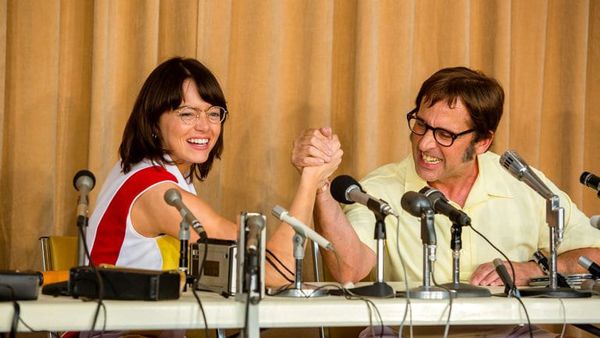Eye For Film >> Movies >> Battle Of The Sexes (2017) Film Review
Battle Of The Sexes
Reviewed by: Anne-Katrin Titze

In 1973, a tennis match took place inside the Houston Astrodome between Billie Jean King and Bobby Riggs that was reportedly watched by 90 million people all over the world. Jonathan Dayton and Valerie Faris in their film, co-produced by Danny Boyle, with a screenplay by Simon Beaufoy, take the clownishly hyped event as the kernel and smashingly feather out the manifold surrounding issues at stake.
In Battle Of The Sexes, audiences are not hit over the head with a racket, but allowed to follow the balls hit in different corners of changing societal norms. The movie's lightness and beauty helps in connecting the dots - where enormous progress has been made and where more work remains to be done.

Emma Stone as King is much more of a full-fledged human being than in Birdman Or (The Unexpected Virtue Of Ignorance) or La La Land ever allowed her to be. She glows from within when romance strikes. She and Andrea Riseborough, as hairdresser Marilyn Barnett, have terrific chemistry. Their love story comes at an inconvenient point in King's pro tennis career and emerges as ever more poignant.
Right from the start, Sarah Silverman as Billie Jean King's manager Gladys Heldman, the main force in getting the Virginia Slims women's tour going, doesn't miss a beat about what is at stake, and that goes far beyond tennis. Over the appalling discrepancy between male and female players' prize money, she and Billie Jean confront Jack Kramer (Bill Pullman) and his pal Bob Sanders (Tom Kenny) at their private club in New York City. When Bob tells Gladys that she is not supposed to be here, she counters: "Because I'm a woman or a Jew?"
Kramer and his sidekick Sanders remind the ladies that men are better, faster, stronger, more fun to watch and have families to feed. And that's why they deserve eight times more money than the women players. The difference between thinking something and actually getting away with saying it is still a burning issue today.
King's husband Larry (Austin Stowell), his hair the exact golden tint and shape of the Ken doll who teamed up with Malibu Barbie, is not presented as an enemy, nor an airhead. He sees and understands and handles situations as best he can and doesn't lose his sense of humor either. Which is one of the great achievements of this film. A movie can be well-meaning and funny, good-looking and about a serious battle that is far from over.
We see Bobby Riggs (Steve Carell) on a Manhattan rooftop tennis court at night, where the former champion, now in his mid-fifties, plays a match - on a bet, for sure - while holding two afghan dogs on a leash. The relationship between Bobby and his wife Priscilla (Elisabeth Shue) and his sons reveal a man who hand-picked the "chauvinist pig" label as a way to get attention in the sense of - how far can he push it and still be lovable?
Riggs is a gambler, so much so that during a gamblers anonymous meeting (in a church community room adorned with a rainbow), he tells the sad-faced attendants that their problem isn't really gambling but that they're bad at it.
The main players' private lives speak of greater changes in society without turning them into puppets representing concepts. Everything feels alive and the production design by Judy Becker is impeccable. There are the state-of-the-art Seventies pay-per-view TV seats at an airport - a banner greets Aloha - the women's team huddles around to watch an important tournament en route. Things and places look genuine and fresh simultaneously, which is a rare feat for a, to use the dreaded word, biopic.
The TV commentators we get to see in Battle Of The Sexes are the real ones from the Seventies blended with the fiction of 2017. The actual Howard Cosell, merges with the actress Natalie Morales playing the real Rosemary Casals. It is a fabulous example of the period's casual sexism. He is seen grabbing the back of her neck, as if she were a rabbit, while introducing "little Rosie Casals" to the viewers of the television broadcast.
We do not have to go all the way back to Ibsen's A Doll's House to find examples of woman-as-child equations. In a lovely turn, it is so clearly Riggs who has not outgrown his short pants. In a scene that allows Carell to be most innocently playful, Bobby and his young son play swamp in the living room, hopping from sofa to chair, so as not to touch the ground and sink into the imagined quicksand. The moment is unnecessary for the plot, and yet, it tells us almost all we need to know about this old child.
The closest to a villain here is Jack Kramer, who arrestingly layers centuries of conviction of male superiority with a keen sense that what he took for granted is now under attack. During a telling exchange right before the big match, King gets to the point. Bobby, she knows, is "a clown" and most of his women-bashing "an act". As for Kramer, she says "it's real" and this is why she doesn't want him to participate as a commentator during the match.
Alan Cumming is Ted Tinling, who designed the tennis outfits for the Virginia Slims Circuit (recreated in all their splendour by costume designer Mary Zophres). Besides innovating the colour on the court, Tinling gets to be a slightly removed voice from the future, our present, telling Billie that acceptance will change and we will all one day be allowed to openly love whom we love. Stone's King switches glasses frequently, from round to aviator shape, back and forth, with no apparent pattern, other than her mood. A strange and wonderful detail about ways of seeing.
Battle Of The Sexes, which will have a London Film Festival Gala premiere in October, dazzles in its vigorous combination of the big and the small, the real and the symbolic - the absurdity of a cigarette brand sponsoring a tennis tour, the stranglehold of patriarchal privilege, and a media that tries to distract the public with a circus.
Reviewed on: 13 Sep 2017















